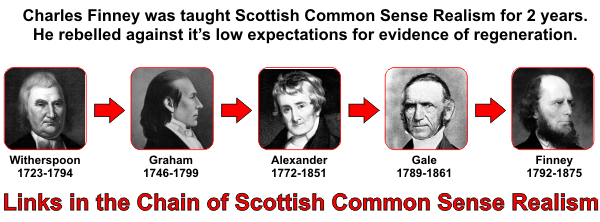How Archibald Alexander Relates to
the
Heresy of
Decisional Regeneration
![]()

![]()

Excerpts and comments on the biography, LIFE OF ARCHIBALD ALEXANDER by his son, James Alexander. It is valuable to compare the formative thinking of Archibald Alexander to that of George Washington Gale. Both grew up in New England visiting Presbyterian churches of both the Old Side and New Side views of regeneration. Contrary to many modern histories, the "enthusiasm" of George Whitefield and Jonathan Edwards was not shared by all Presbyterians. The Old Side churches stayed open when large numbers started New Side churches. The big difference between George Washimgton Gale and Archibald Alexander, was Gale was not mentored by a Scottish Common Sense Realist until AFTER he had formed his view of the experiencial expectations of regeneration. This biography is valuable as a virtual Who’s Who of second generation New Light Calvinism. Archibald Alexander preached for Nathan Strong, Samuel Hopkins and Nathaniel Emmons. He meets Jonathan Edwards, Junior and was a delegate to the meeting where the Plan Of Union was approved. Like Barton Stone, he flirts with being a Baptist for two years, but unlike Stone, returns to Presbyterianism. Archibald Alexander (1772-1851) was the first professor at Princeton Theological Seminary and founder of the Princeton Theology. Born in Rockbridge County, Virginia, Alexander grew up in a frontier environment and was converted at the age of seventeen. Having little formal education, he studied theology with William Graham at Liberty Hall Academy (Washington and Lee University). Prior to assuming his duties at Princeton in 1812, Alexander pastored churches, led revivals and served as president of Hampden-Sydney College (1796-1807) in his native Virginia and ministered in the Pine Street Presbyterian Church in Philadelphia (1807-1812).
Recognizing the need for institutions providing formal training for Presbyterian ministers, Alexander issued a call for schools in 1808, and in 1812 Princeton Theological Seminary emerged as the first Presbyterian seminary in America, with Alexander as its first professor. To accomplish these ends Alexander taught Scottish Common Sense philosophy, which he had learned from William Graham. Under this school of thought the defense of Christianity begins with reason judging external evidences for the truthfulness of Scripture: the credibility of its witnesses, fulfilled prophecy and cultural benefits attending the spread of the gospel. But more effective in establishing biblical truth are internal evidences: the self-authenticating purity and sublimity of its content as attested by the Holy Spirit. To this philosophical base Alexander added seventeenth-century Reformed theology—the Westminster Confession and the work of Swiss theologian François Turretin (1623-1687). Starting with John Witherspoon (1723-1784) in
All excerpts from the biography are in black - comments will be in blue. A baptist named Mrs. Tyler tries to help the 16 year old Alexander understand salvation.
|